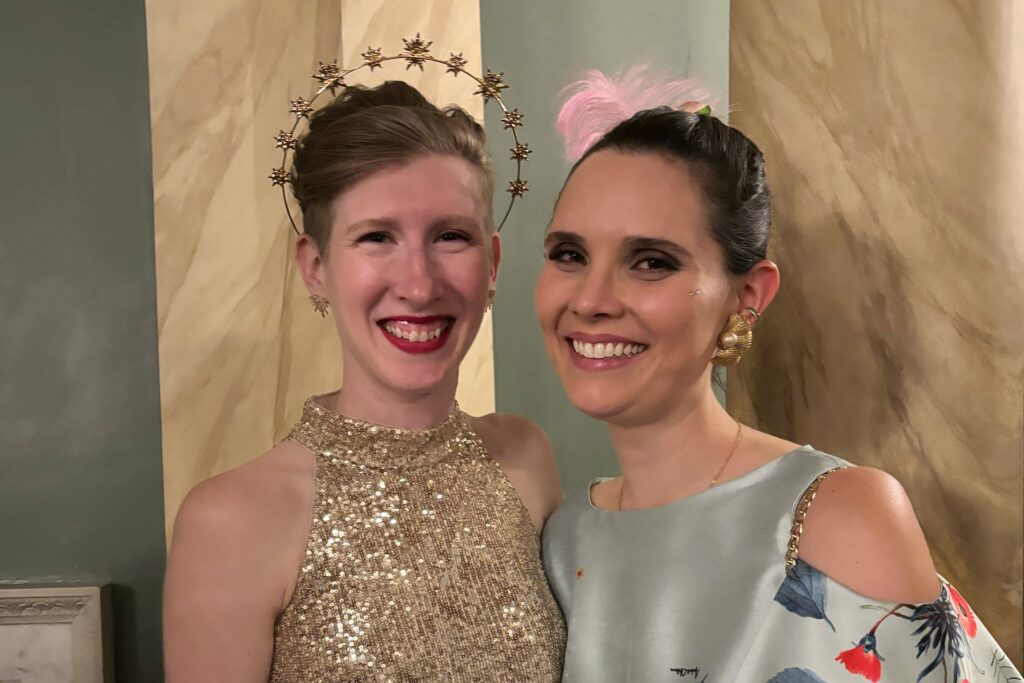Dear fashion friends,
June was unexpectedly the busiest month of my year so far. As I wrapped up my first term teaching at De Montfort University, I was hoping to find the brainwidth to finally catch up with my podcast, our educational programming at the Fashion and Race Database, and my very own fashion curating projects.
But, between grading final papers, writing and editing upcoming publications on fashion exhibitions in Latin America, and attending what felt like a million events before I left the UK to do summer research abroad, I found myself stretching a bit too thin.
So I took a step back from my ambitious schedule to recalculate and find a bit of harmony in my life.
This meant following my intuition and “irrationally” adding a couple of trips (and a Karol G concert on a Tuesday evening!) to my already very busy schedule.

On June 15th I went to Bath for a Fancy Ball at the Assembly Rooms and stayed overnight just because I needed a change of scenery. The following weekend I went to Greece to visit my friend (and amazing scholar, though not in the fashion field) Rebecca Levitan just because I needed to spend some quality time with her, breathe some fresh Mediterranean air, and visit a bunch of Ancient sites as I meditated on my next research pursuits.
Believe it or not, these extra weekend trips were just what I needed to keep my creative juices flowing without burning out. Instead of interrupting my writing and marking flow, they actually enhanced it. I even had the time to revamp and relaunch my Redressing Fashion Club, which I hope you’ll join if you’re looking for more safe spaces to exchange ideas and engage in thought-provoking conversations about fashion.
My last-minute trips also confirmed the biggest lesson I’ve learned in the past 12 years of my life in academia (that is short for juggling between too many projects at the same time): that we all need to find ways to disconnect and recharge if we truly want to succeed in our professional lives.
Yet both academia and fashion seem to have been built completely against the idea of a harmonious lifestyle. In academia, there is an expectation that we publish constantly, advise and support students, engage in public-facing activities, participate in university committees and (inter)national organizations, and generate impactful studies, in addition to our already packed teaching schedules. In fashion, the increasingly fast rhythm of production and consumption met with an illusory quest for novelty and innovation, creates a similarly intense environment.

Last year, Vogue Business published a 4-part series debunking the dream of working in fashion, which concluded that fashion is facing a burnout epidemic. This plague is caused by a systemic lack of work-life balance that adds unnecessary stress, limits opportunities for recovery, and prevents optimum performance in the long term. As is often the case, the most affected people are members of marginalized communities, freelancers with precarious working conditions, and purpose-driven professionals.
The report cited Subira Jones’s burnout prevention and recovery toolkit, which includes recognizing the problem, removing unnecessary stress, creating financial safety nets, finding space to rest and recharge, and setting boundaries from within the workspace.
These all sound pretty straightforward, but at the same time are so vague that I was left wondering what, exactly, will it take to find more harmonious ways of existing within fashion—and actively fight the burnout epidemic.
The problem is that, because burnout is systemic to fashion, it becomes almost unavoidable. And it requires quite a lot of privilege to be able to actually push back.
In my case, I’ve realized that I am now able to request writing extensions because I don’t need more publications to keep growing in my career (at least right now). I know that I can spend a full day writing at the beach because my work allows for a flexible schedule, just as long as I deliver my in-person lectures when required and fulfill my research responsibilities on time. And, after a decade of very unstable employment and financial situations, I finally am in a slightly more secure place with two stable jobs that complement one another.

But for many people working in fashion (or academia) this is not the case.
Many struggle to make ends meet by juggling several jobs—some of them completely unrelated to one another, which of course takes a lot of added energy. More generally, the frantic rhythm of fashion trends is mirrored in every single space within the industry—and even in parallel fields like fashion academia and the fashion media.
So, if burnout is such an inherent problem in our contemporary fashion system, then fighting burnout must be one of the most important actions we can take to actively redress fashion.
In other words: to decolonize fashion we need to strive to avoid burnout.
Unfortunately, I don’t think the fashion system—or our broader contemporary hustle culture—is ready to embrace it. Proof of this is that fashion has kept up its usually frenetic rhythm even as more and more people are falling into the cracks of burnout. And when it comes to decolonization, it has become more of a trending topic than a serious (and revolutionary) pursuit within the industry. But more on that some other day.
What do you think it will take to end fashion’s burnout epidemic and, in doing so, move towards decolonizing fashion? Let me know what you think on my social media or by leaving a comment here or in my brand new YouTube channel.
And if you’re a member of my recently revamped Redressing Fashion Club, do expect to talk more about fashion’s burnout epidemic in our weekly office hours.
As always, thank you, thank you for reading, watching, and joining the conversation.
Until next time,
—L 🩷
PS. Remember you can subscribe to my email list to receive blog updates directly to your inbox.
Leave a Reply